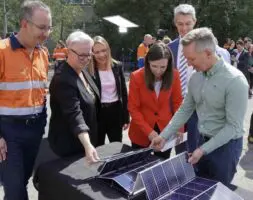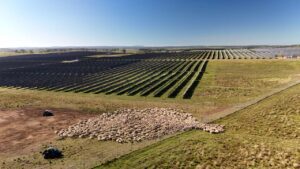The European Council and Parliament have reached a provisional agreement on the Net-Zero Industry Act which has been designed to strengthen local net-zero technology manufacturing.
The provisional agreement establishes regulations that require future renewable energy auctions to apply both pre-qualification and award criteria which are not price related.
These criteria include examples such as technology supply, environmental sustainability, contribution to innovation, or integration of energy systems, and will have to apply to at least 30% of the volume auctioned very year per member state.
These so-called “resilience criteria” are designed at least in part to help European clean technology manufacturers better compete against cheaper imports while also diversifying the energy sector’s supply chain.
Specifically, every EU Member State with a tender volume in excess of 6GW of renewable energy per year must select 30% of the tendered volumes according to resilience criteria, as compared to simply choosing the “cheapest” options.
Additionally, a maximum of 50% of the net-zero technologies required for a project, such as solar modules, can be imported from a single country per year, ensuring local supply can more easily compete with cheaper international imports.
“With the Net-Zero Industry Act we want to support our industry in its transition,” said Jo Brouns, Flemish minister for economy, innovation, work, social economy, and agriculture.
“The NZIA is an important step in creating the necessary ecosystem to boost the manufacturing of clean technologies. Europe launched a pathway towards a cleaner and sustainable future for the European industry.
“Now the time is ripe for Europe to take back the lead on the global scene for clean technologies and to build a competitive, green, and job-creating industrial sector.”
A fine line and a tightrope
The European Union has been negotiating the Net-Zero Industry Act for months now and have had to walk a fine line in meeting the needs of the EU’s overall net-zero ambitions as well as the needs of the region’s clean technology manufacturing sector.
A so-called “perfect storm” of market conditions over the past 14 months has seen the solar industry in Europe struggle to compete with an influx of cheaper imports.
Specifically, strong global demand and increasing competition between Chinese suppliers led to significant new investment in solar PV supply chains during 2023. This subsequently resulted in oversupply leading to rapidly declining prices for raw materials like silicon, affecting the supply chain down to modules, inverters, and batteries.
Over the past eight months, solar panel prices in Europe have fallen by over 40% due to this global oversupply.
At the same time, European solar manufacturers found it increasingly difficult to sell their products in the face of much cheaper Chinese solar products and oversupply.
“While price drops are typically welcome news, if unchecked they have serious repercussions for our open strategic autonomy,” said Walburga Hemetsberger, CEO of SolarPower Europe, speaking in September about the “perfect storm” affecting the industry.
“In the short term, this is already posing real challenges to domestic competitiveness and the rebirth of EU solar manufacturing. We’re urgently calling on EU leaders to save Europe’s strategic tech supply lines.”
SolarPower Europe has repeatedly called on the European Union to intervene to support the region’s clean energy technology sector and avoid European companies being forced to shutter their doors. Measures proposed included buying up European PV manufacturer’s module inventories, or potential “safeguard” measures that could include import tariffs and quotas.
However, SolarPower Europe has been forced to walk its own tightrope, seeking to support both local manufacturing as well as the deployment of solar and the thousands of jobs attached to solar deployment.
At the same time that SolarPower Europe has been calling on the EU to support the local supply chain, it was one of 433 European solar companies and associations that signed a joint letter warning the EU not to impose trade defence measures on solar PV products that would affect the necessary rollout of solar generation capacity.
In the November joint letter, the groups said that “We fully support and are committed to the re-shoring of European solar manufacturing, including the EU’s target of reshoring solar manufacturing capacity to a minimum of 30 GW by 2025 across the solar PV supply chain. However, we caution that it is vital to choose the right tools to make this happen.”
Net-Zero Industry Act negotiations
In response to these competing concerns, the EU’s Finance Commissioner, Mairead McGuinness, told the European Parliament on Monday that the EU was working on a raft of instruments aimed at supporting the local European solar industry in the face of an oversupply of cheap Chinese solar imports.
However, McGuinness warned that the EU could not unilaterally turn its back on Chinese imports if it is to also reach its target of 750GW of solar generating capacity by 2030.
“Given that we currently rely to a very important degree on imports to reach EU solar deployment targets, any potential measure needs to be weighed against the objectives we have set ourselves when it comes to the energy transition,” McGuinness told lawmakers.
McGuinness had said she recognises the difficulties being faced by Europe’s solar manufacturing sector and promised that the EU is soon to implement rules designed to prompt public authorities to consider factors other than price when holding tenders for renewable energy technologies.
According to McGuinness, among the pending rules is a push to ensure that no more than 65% of supply comes from a single source. McGuinness also added that, under more flexible state aid rules, the European Commission has approved nine initiatives with a budget of more than €12 billion for clean technology equipment, including solar panels.
The European Union is also reportedly working with countries such as the United States and India in an effort to reduce reliance on Chinese supply.
A provisional deal
The European Council and Parliament announced on Tuesday the results of their negotiations on the Net-Zero Industry Act, or NZIA, revealing plans to both boost the industrial deployment of net-zero technologies needed to achieve the region’s climate goals while also supporting Europe’s clean energy technology sector.
The main elements of the agreement include streamlined rules on construction permit procedures, the creation of net-zero industrial valleys, and greater clarity on criteria for public procurement and auctioning.
It is this last element which has been the focus of so much attention, and which has been warmly welcomed by the industry.
“Landing the Net-Zero Industry Act is a crucial landmark in Europe’s clean industry story,” said Dries Acke, policy director at SolarPower Europe.
“In public procurement and parts of energy auctions, EU countries now have the possibility to reward project bidders based on non-price criteria, like sustainability or resilience.
“We understand these criteria will apply to a minimum of 30% of auctions initially. This is a positive, measured, approach, which will help EU solar manufacturers finance project pipelines, knowing that there is reliable demand for their product. This also means the rest of the auction market should remain unaffected, maintaining the necessary pace of solar deployment. To guarantee this win-win, we encourage member states to act swiftly while respecting the 30% threshold.”
The provisional negotiations were also welcomed by Renew Europe, the pro-European and centrist political group in the European Parliament.
“The EU Green deal will not go through without EU industries,” said Christophe Grudler, MEP for Mouvement Démocrate, France and Renew Europe’s shadow on NZIA.
“The Net Zero Industry Act will help us to strengthen our industrial sovereignty by expanding the production of clean technologies made in Europe, supporting innovation and facilitating permits, one of the major hurdles for industries to settle in the EU.
“In the context of anti-competitive practices and massive subsidies from China and the United States, NZIA is, in short, a European answer for our industries to succeed in reaching our climate goals without undermining their competitiveness. The age of innocence is over”.
Not all are happy
Despite the general support for the result of negotiations into the NZIA, not everyone is pleased. WWF Europe have expressed their concern over the broadening of technologies included in the Act to include “technologies which are not yet commercially available and/or could take decades to become so”.
“With this final deal, the European Parliament and Council have lost their green focus and are instead relying on hocus-pocus,” said Camille Maury, senior policy officer on the decarbonisation of industry at WWF European Policy Office.
“This Regulation was supposed to target only technologies with a proven and substantial impact in achieving the EU’s 2030 climate targets, such as wind and solar, heat pumps, batteries, electricity grids and renewable hydrogen for targeted sectors.
“Broadening the scope of the Net Zero Industry Act, while public investments are limited, risks diverting taxpayers’ money to magical future techno-fixes, and away from the available and proven key green technologies we need to achieve the EU’s 2030 climate targets and decarbonise our industry on time.”










